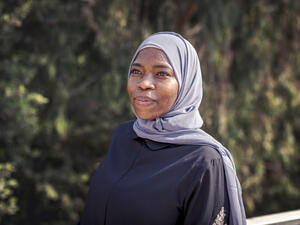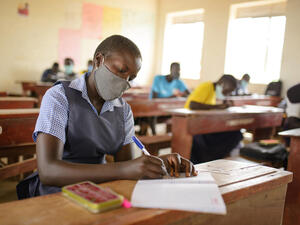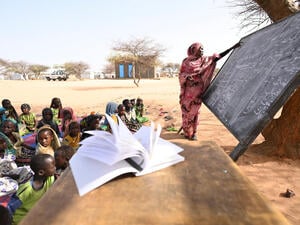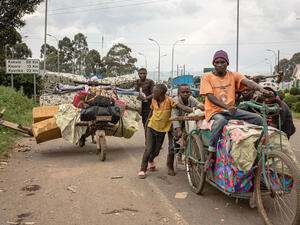Bookworms study their way out of world's largest refugee complex
Bookworms study their way out of world's largest refugee complex
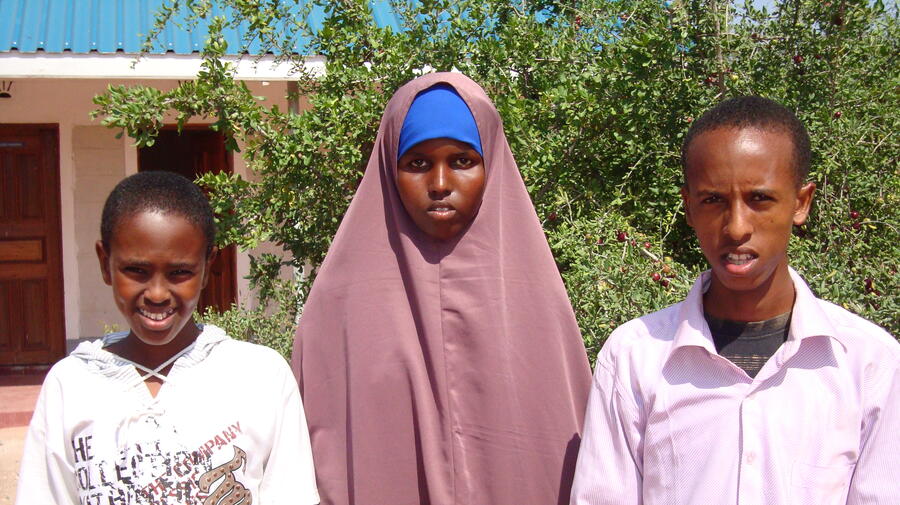
Mohamed, Amino and Abdullahi pose for a photograph in Hagadera before leaving for their new schools.
DADAAB, Kenya, February 24 (UNHCR) - It's said that books allow you to escape to another world - that's certainly been the case for four young Somali refugees whose love of reading has helped them win scholarships to some of the top secondary schools in Kenya.
Three of the teenagers, Mohamed Abdi Samatar, Amino Mohamed Mohamud and Abdullahi Mohamed Yussuf, have spent all or most of their life in Hagadera, one of three camps housing some 300,000 mostly Somali refugees around the north-east Kenyan town of Dadaab. The fourth student, Hassan Muktar Abdi, was born in Dadaab's Ifo camp.
"This is a fantastic achievement," Maureen Kopiyo, a community services education officer for UNHCR in Dadaab, said of the four, who started at their new schools as boarders earlier this month. The Windle Trust Kenya is sponsoring Amino, while UNHCR has covered the costs of the three boys for this academic year and is looking for funds for their final three years of secondary education.
Last year, Mohamed and Amino vied to be top of their class at the UNHCR-funded Amani Primary School in Hagadera. The self-confessed bookworms received their Kenya Certificate of Primary Education in December and were preparing to enter one of the two secondary schools in Hagadera.
Amino, confident that she would be continuing her studies in the sprawling camp that has been home since her family fled to Kenya in 2000, had rushed home after her final exam and asked her father to buy her a new school uniform. "Haraka, haraka haina baraka," he urged her, citing a Swahili proverb that translates as "hurry, hurry has no blessing."
Not long afterwards, an elated Amino was told that she had won a scholarship to the prestigious Kenya High School in Nairobi. Mohamed, who was born in Hagadera, learned that he would be studying near his classroom rival at Nairobi School. It will be a huge new adventure and opportunity for the bright 14-year-old, who has never ventured beyond the red, sandy soil of Hagadera.
"My family always used to tell me to work hard, perform better and be a good example to my sisters and brothers," said Mohamed, the eldest of seven children. "My family is sad that I will be leaving them to go to school, but their happiness for me is greater."
Amino will also miss her family and friends, but she knows this is a golden opportunity. And the two Amani Primary School alumni will be taking away a memento of their former classmates - an album of photos put together by their headmaster. Their own pictures will be prominently displayed in their primary school as an inspiration to the pupils.
Abdullahi is another top student from Hagadera, but he went to the camp's Central Primary School and has secured a place at the Alliance High School in Nairobi. The aspiring engineer came to Dadaab in 2002 from the Ogaden region of Ethiopia and is looking forward to studying maths and science.
Hassan, meanwhile, is the first student from Ifo camp to win a scholarship to a secondary school. The confident young man wants eventually to help others, either as a doctor or a humanitarian aid worker. "Refugees can do as well as anyone else if they work hard and at their own pace," he notes, adding: "I can do better in the years to come."
None of the four students seemed to be apprehensive about this exciting new chapter in their lives. "We will adapt and be a friend to people," said Abdullahi.
UNHCR's Kopiyo said the four scholarship students were "a shining example to other learners in the camps as to what can be achieved through hard work and dedicated study." The schools in the Dadaab camps are run by UNHCR's implementing partner, CARE.
By Andy Needham in Dadaab, Kenya

